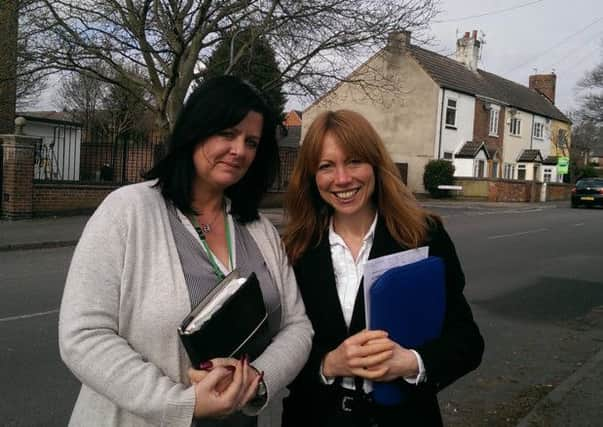FEATURE: A day with Eastwood’s social workers


There’s a stigma attached to the work they just can’t shake, when the last thing they want is to take kids away from their families. But with government cuts and a rising need for the service, they come under pressure in more ways than one.
There were over 10,000 children in need in Nottinghamshire last year and the number of Looked After Children has risen by almost half in the past five years.
Advertisement
Hide AdAdvertisement
Hide AdEastwood is a particularly prevalent area for case workers, with a high level of deprivation, unemployment, and drug and alcohol abuse.
And the pressure has been felt in the number of sick days taken in the department, says Broxtowe team manager Sophie Eadsforth.
She adds: “In this job you can’t just knock off – you are dealing with children at risk, so you know you need to make every visit, you know you need to write it up. About six months ago I could see in everbody’s physical health that they were so stressed.
“Things have gotten better though, we are the only department to have hired extra staff recently, and we have technological advances like using tablets to do casework on the go.”
Advertisement
Hide AdAdvertisement
Hide AdThere is particular stress from difficult families, she adds.
“There are some families where the dad isn’t allowed to be at home as part of the agreement, but when you get there you might find him hiding under the bed.
“When you check families are budgeting properly you often ask to look in the cupboards. I’ve had a case where a mother lined the kitchen with empty tins to make it look like she had food in. Some people try to deceive you like that, and you’ve got to understand they are likely to have not had a good upbringing themselves and will know what to say.
“It sounds like we’re trying to catch them out but we need to make sure they are working towards better outcomes for their children.”
Advertisement
Hide AdAdvertisement
Hide AdThe front line workers deal with this kind of fear every day, says social worker Sarah Straw.
“There’s this fear of every parent to begin with that we’re this huge threat – that’s the stigma we carry. But our job is to keep children in their own homes, not to remove them.”
Staying with family is always the favourable option – outcomes are proven to be better at home, when it’s safe, compared to elsewhere – so this is always what they hope to achieve, but every case is different, and particularly for older children and teenagers in care who are less likely to enter fostering or adoption.
“Older children with social, emotional and behavioural difficulties may find it harder to feel part of an alternative family, because they’ve got into a position where they can’t work to family rules, and this often doesn’t work for the families who can’t cope with these kinds of children,” says Sarah.
Advertisement
Hide AdAdvertisement
Hide Ad“You also often find teenagers who feel they are betraying their parents by being with another family – all kids love their parents no matter what, and a lot of them try to protect them by not allowing a “new mum and dad” in their lives, so to speak.”
It can be a challenge for social workers to remember who they are working for, she adds.
“You have to constantly remind yourself that your focus is the child because some parents really flood you with their issues, and you have to bring yourself back to the child.”
And the most important thing when working with parents is trust.
Advertisement
Hide AdAdvertisement
Hide Ad“It takes time for people to open up to you and obviously you are intruding on their lives and asking them the most intimate questions. The only way you build a positive relationship with them is by being honest and open yourself, and make sure they know you’re not there with some hidden agenda. You need to build that trust.”
In the next edition we visit one of the families Sarah has been working with to see how they are doing since entering the system.